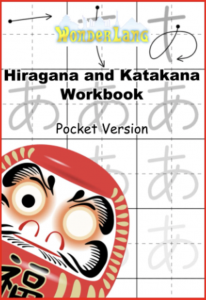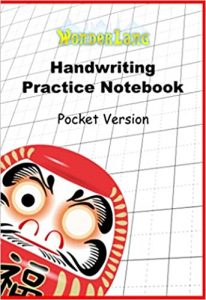Hello Everyone,
In this lesson I will give you some tips to help you mastering hiragana and katakana.
| Amazon.com Amazon.co.uk Amazon.de Amazon.fr Amazon.es Amazon.it Amazon.co.jp |
 |
Amazon.com.br Amazon.ca Amazon.in Amazon.com.au Amazon.com.mx Amazon.nl |
Practice makes perfect
There is no magic, to master something, you must practice it. And even when you think you have mastered it, continue.
If you have followed my hiragana and katakana lessons, you may have noticed that in the exercises part I systematically asked you to write this 10 times, and that 5 times, and so on. And you may have spotted that as you progressed through the lessons, some characters came more naturally. That’s as simple as this.
Identifying the points the improve
To be efficient in your practice, you have to identify what are your strength and weaknesses.
And remember that, as I stated in my article Learning hiragana and katakana, there are three aspects to learn: Recognizing the characters both by their shape and sound, pronouncing the characters, and writing the characters.
Writing
In writing, the most basic exercise I know to identify your strength and weaknesses is to reproduce the hiragana and katakana tables.
You know there are 46 characters in each table, 5 columns: a, i, u, e, o; and 11 rows: ・-, k-, s-, t-, n-, h-, m-, y-, r-, w-, n; and here you go! you try to fill the tables. You will quickly see which characters come out easily, for which ones you have some hesitations, and the ones you have difficulties with.
Once this is done, continue your practice giving somefocus on your weaknesses. Repeat this evaluation once or twice a week for instance if you are practicing everyday.
For your practice you can use some of the material below, or you can come back to one particular lesson and make the exercises there.
- Empty grid sheet
- Hiragana a, ka, sa rows
- Hiragana ta, na, ha rows
- Hiragana ma, ya, ra, wa, n rows
- Katakana A, KA, SA rows
- Katakana TA, NA, HA rows
- Katakana MA, YA, RA, WA, N rows
- All base hiragana on one sheet
- Hiragana with dakuten and handakuten, and some punctuation on one sheet
- All base katakana on one sheet
- Katakana with dakuten and handakuten on one sheet
- Hiragana and katakana reference page – use this page to get access to the different hiragana and katakana lessons to get animated strokes and exercises.
Reading
To identify your strenghs and weaknesses in reading, the more simple is to try reading some texts and to take notes of the characters you have difficulties or fail to recognize. Then give these characters some focus during your practice (see links above).
On WonderLang you will find some short stories in hiragana with the romaji transcription and all the vocabulary:
You will also find in these pages some references to web sites providing further beginner reading material.
You can also have a look at the NHK website: http://www3.nhk.or.jp/news/easy/. Their articles are entirely available in hiragana/katakana (with furigana for kanji).
If you need some help to identify some characters or for the pronunciation, here is some material:
- Introduction to hiragana and katakana.
- Bookmark cheat-sheet that you can cut out and fold to bring along with you anywhere.
- / Self promotion! / T-shirts v( ^^)v
 |
 |
 |
 |
 |
|||
Listening
You will find some videos on the WonderLang YouTube channel providing some basic listening practice:
(I will add some listening exercises soon on
In the meantime you can use material such as the following one which will also provide you with some vocabulary:
https://www.youtube.com/watch?v=DcCdJilQGZw
You can also spend some time loop listening to your favorite anime openings, or your favorite JPop, JRock or Enka songs, and write down what you get from it (using hiragana and katakana of course). You can also try to get as much as you can from anime or drama episodes; but I would rather, at least at first, advise you to listen to something shorter so that you can go through it multiple times and refine your understanding.
Also, the NHK website mentionned above proposes audio transcripts of its articles, therefore you can try to write what you hear and check with the original text to see if you caught things correctly.
Here is a playlist I propose to discover Japanese music:
You can easily find song transcripts in Japanese and romaji on the web (type the title of the song followed by lyrics: “one ok rock beginning lyrics” for instance)
Speaking
Speaking may be the difficult part. The best option would be to have someone of your family or friends to practice with.
There is also the option to use social media (Line, Hangout…) which can offer the possibility to exchange with native speakers or other learners, potentially in return they would be interested in practicing your native language with you. There are some discussion rooms on Facebook or Google+ to ask for such services.
Vary your exercises
Variety is key to mastery. If you do not vary your exercises, you will develop some conditioning mechanism which will slow you down in your learning.
What I call a conditioning mechanism is for instance the fact that you may only be able to write an え if you write first あいう. This happens because your brain develops some mechanisms which are triggered on specific conditions, in the exmaple above for instance the fact to only write characters by going through the あいうえお sequence, and if you don’t vary these conditions then you will be blocked or have to reproduce the triggering sequence to get to your result. The same when using songs for your listening practice. You may come to “know” the lyrics of a song by heart and therefore no longer listen to the song but rather recite what you have learnt.
To avoid this, try to add some variation to your exercises. Do some of our exercises and add some NHK news reading and listening, listen to new songs, look at new anime episodes in Japanese…
Practice, patience and perseverence
The brains learns with time and rest.
Be patient: Trying to stuff all the exercises you can and trying to master everything within one day will surely give some results, but if then you don’t practice for one month everything will be lost and you will have to start from the ground up again.
Practice regularly: Build a schedule according to the time you have available and set you target: 5 characters a day, or 5 characters a week, for instance. And after a certain amount of time make an assessment as indicated above to identify your strength and weaknesses, and include reinforcement in face of these weaknesses in your schedule.
Don’t give up: You may have difficulties to stick to your schedule sometimes, but what is important is to come back to it as soon as you can and take it where you left it.
And repeat!
This is the end of this article. I hope you liked it. Do not hesitate to post a comment, be it here or social networks:
- Facebook: https://www.facebook.com/WonderLang.xyz/
- Twitter: https://twitter.com/wonderlang_xyz
- Google+: https://plus.google.com/106961151498223949055
- Reddit: https://reddit.com/r/wonderlang
- Instagram: https://instagram.com/wonderlang_xyz
- YouTube: WonderLang YouTube channel
バイバイ,
Stéphane
| Amazon.com Amazon.co.uk Amazon.de Amazon.fr Amazon.es Amazon.it Amazon.co.jp |
 |
Amazon.com.br Amazon.ca Amazon.in Amazon.com.au Amazon.com.mx Amazon.nl |
